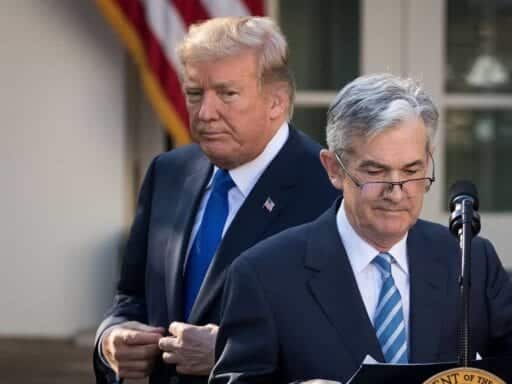A broken norm, but also a decent point.
Speaking to CNBC’s Joe Kernen, President Trump took the unusual step of criticizing the Federal Reserve Bank for its current trajectory of higher interest rates, saying he’s “not thrilled” by the Fed’s plans to raise interest rates.
WATCH: President Trump lays into the Fed, telling CNBC that he’s ‘not thrilled’ about interest rate hikes https://t.co/5JKBCYHe0g pic.twitter.com/0AJjOX7NbK
— CNBC Now (@CNBCnow) July 19, 2018
Presidents working in the aftermath of the inflation of the 1970s have generally refrained from commenting in public about the Fed’s management of the macroeconomy. During Barack Obama’s administration, it was exceptionally hard to get any official at any level to express any view even off the record because they were so firmly committed to upholding the tradition of the Fed’s operational independence.
That’s in part because post-Nixon presidents who tried to gently nudge the Fed often found that it backfired, with the central bank feeling it now had to bend over backward to demonstrate its independence. And even Trump, while saying he’s “not happy about” rate increases, was at pains to clarify that “at the same time, I’m letting them do what they feel is best.”
Also: One thing that the Reagan and HW Bush administrations learned the hard way: Blatant political pressure on the Fed can backfire, and cause central bankers to dig in their heels.
— Neil Irwin (@Neil_Irwin) July 19, 2018
It’s not unusual for Trump to break with norms governing presidential conduct, though in this case, he may find that there’s some support for his position on the left side of the political spectrum.
The Fed’s basic position is that with the unemployment rate now low and the inflation rate near the Fed’s 2 percent target, the time is right for a measured series of interest rate increases aimed at restraining the pace of economic growth. To do otherwise, as the Fed sees it, would be to risk sparking a higher pace of inflation that might then require a much sharper series of rate hikes.
The contrary view contains several points:
- Despite the low unemployment rate, the employment rate — i.e., the share of workers who have a job — remains well below its peak level.
- Wage growth, though faster than it was a few years ago, remains slower than it was before the recession.
- Corporate profits are at near-record levels, so companies can afford to pay more for their workers.
- Recent inflation has been very much driven by rent increases rather than broader price trends in the economy.
On that view, the smart strategy is to keep rates low, trust that the employment-population ratio will continue to rise, hope that workers’ growing bargaining power lets them get some wage increases, and ideally address the shortage of apartments to rent on the supply side rather than by trying to slow economic growth.
Read More
https://cdn.vox-cdn.com/community_logos/52517/voxv.png



